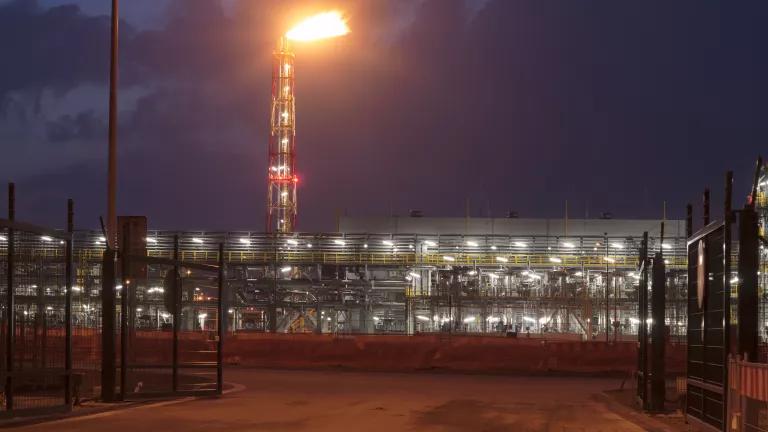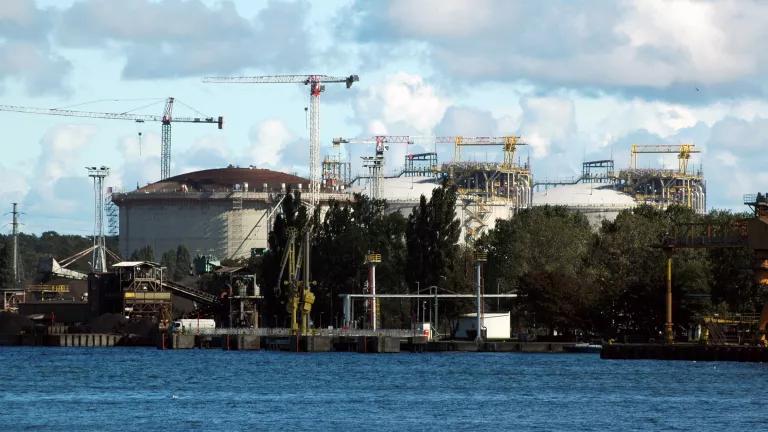On This Earth Day: Outrage and Hope
We must find opportunity amid crisis and seize the moment for change—at home and abroad.

Ukrainian Tanya Marshall leads people in a march for peace in Ukraine in Boston, Massachusetts, on March 6, 2022.
Like millions of others around the world, I’ll mark this Earth Day with both outrage and hope. I can’t seem to untangle the two.
We’re all outraged by the senseless and savage brutality Russian troops are inflicting on the people of Ukraine. We’re angered, too, by the spikes in food and energy prices Russia’s aggression has caused, and the genuine crisis it’s imposed on hundreds of millions of people worldwide.
It’s frustrating, also, to know the Kremlin is bankrolling these atrocities largely by selling oil and gas—nearly $40 billion worth just since the invasion began—to the European countries allied with the United States in our support for Ukraine.
And it’s maddening to see the U.S. oil and gas industry try to exploit this tragedy as a way to lock us into decades’ more dependence on the very fuels that hold our families and businesses hostage to global price shocks we can’t control while driving the world toward climate catastrophe and padding the Kremlin war chest.
This is no time, though, to sink into despair.
I’m optimistic, in fact, that we’ll find opportunity amid the crisis and seize the moment for progress and change—at home and abroad. I’m hopeful for three key reasons.
First, Russia’s invasion of Ukraine has stripped bare any pretense that we might drill our way to energy security. Breaking our dependence on oil, gas, and coal is as much a strategic imperative as an environmental necessity.
Russia is a petrostate. It gets 40 percent of its budget from oil and gas sales. Curtailing that can help grind the Kremlin war machine to powder.
President Biden moved swiftly last month to end U.S. oil imports from Russia. The European Union (E.U.) is working to break free of its reliance on Russia for 40 percent of the E.U.’s natural gas, a quarter of its oil, and nearly half its coal.
The good news is that much of Europe is already moving in the right direction, having pledged to cut greenhouse gas emissions at least 55 percent, compared to 1990 levels, by 2030. That means reducing the use of fossil fuels, including those from Russia, and speeding the shift to cleaner, smarter energy sources.
President Biden has pledged to help.

Golden Hills Wind Farm in Alameda County, California, can provide power to 25,500 homes.
The way to start is for Congress to pass the critical clean energy investments—some $550 billion over 10 years—pending in the Senate, which brings me to my second point of hope.
Two-thirds of the country is united around government action to confront the rising costs and mounting dangers of climate change. That share may well be rising, as people connect the dots between rising pump prices, petro aggression, and the climate crisis.
The package before the Senate, if enacted, will help us get more clean power from the wind and sun; speed the shift to electric vehicles; build a modern, reliable power grid; and make our homes and workplaces more efficient.
The package will fast-track innovation and strengthen the domestic supply chain for clean energy materials and equipment. That will position U.S. workers and companies to help build out the low-carbon economy of the future, in this country, Europe, and elsewhere.
Doing so can create hundreds of thousands of U.S. jobs, some 24,000 in Florida; cut annual energy costs by about $500 per household; and save the country a staggering $3 trillion in health and environmental costs between now and 2050.
That’s the path to real energy security—breaking our dependence on fossil fuels and the damage and suffering they bring.
My third reason for hope: We have the tools we need to strengthen the economy, confront the climate crisis, and secure true energy independence at home and abroad, all while helping to bankrupt the Kremlin war machine.
On this Earth Day, more than ever, it’s up to our leaders to act. And up to all of us to keep demanding nothing less.




